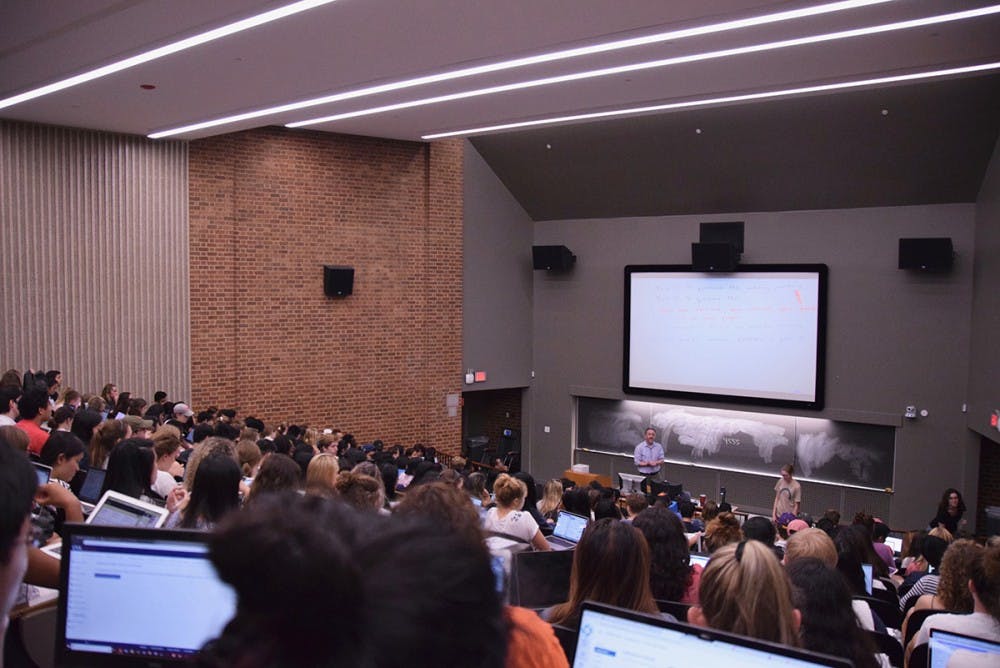Universities have a noble mission — to help their students engage with the world as enlightened, active and critical citizens. Implicit in this charge is the idea that university students should take a diverse and unexpected range of courses. According to the College of Arts and Sciences’ website, “A good liberal arts education… demands not only rigor and depth, but also sufficient breadth to expose students to a wide range of subjects and methods of studying them.” According to countless brochures and mission statements, the world’s most pressing challenges can’t be solved without critical thinking, curiosity and intellectual depth.
However, there’s one notable obstacle to this lofty goal — our grade point average system, which incentivizes students to avoid taking risks in the classroom, sticking with more comfortable subjects instead of more unfamiliar terrain. If we tacked away from our nonsensical overreliance on the grade point average system and encouraged risk-taking, students at the University would be much more likely to have the intellectual exploration in their education that is so aspired to.
Many students at the University are intimately familiar with how the GPA system affects our course selection. We know that the system punishes us for taking harder classes and rewards us for taking easier ones — why take a difficult class and get a low B when we could skate by with an A in another? We scour sites like Course Forum or VA Grades to parse out a class’ difficulty; we ask each other “What’s the grading like?” each time we get a class recommendation. We don’t like shying away from academic challenges, but we know that the course of our lives — jobs, graduate schools, fellowships — seems to hinge on the impersonal and arbitrary metric of GPA.
Even in the classes we do take, we find GPA incentives detract from our experience. As education scholar Alfie Kohn notes, measuring performance via GPA leads to three results. First, our interest in the learning itself is diminished. Second, students come to prefer easier tasks — not because they’re lazy, but because they’re rational. After all, if the point is to get an A, your odds are better if you avoid taking intellectual risks. Third, students tend to think in a more superficial fashion — and to forget what they learned more quickly — when grades are involved. The demands of good grades crowd out our initial noble aspirations for academic growth.
As a solution, the University should experiment with creative methods to end our fixation on GPA and incentivize students to break outside the mold. The University could mandate, or in some other form highly encourage, students to take a course for credit/no credit at least once per school year. Though any student has the ability to take a class for CR/NC, many don’t, ostensibly for the fear that it might raise the eyebrows of a potential employer or take the slot of another class that might otherwise be a GPA booster. By encouraging students to take classes for the sake of intellectual risk-taking — to experience an English class despite fears you don’t write essays well or to take an African-American studies course despite your status as an economics major — the University would foster the spirit of intellectual growth that it aspires to.
Some might say that a mandated credit/no credit system would only encourage more lackadaisical students to be able to slack off with even fewer consequences. If a student was going to slack off in his credit-giving course, what incentive would he have to engage in the CR/NC material if he knew there wouldn’t be a grade? However, most students will likely not view CR/NC courses as a chance to slack off — many of us possess intellectual interests outside of disciplines that we’d appreciate exploring in an environment with lower stakes.
I’m not advocating that we do away with a GPA system entirely. Despite its imperfections, the threat of a poor GPA can provide necessary motivation for students to succeed academically. Plus, when applying to graduate school or jobs, there must be some metric, however imperfect, to judge students’ work ethic and academic performance.
However, to truly fulfill the aspirations of a university education — to create an educated citizenry ready to test dogmas and change the world — it’s crucial for students to venture into unfamiliar terrain. With institutional incentive from the University, we’d be much more likely to do so.
Jack Wilkins is a Viewpoint Writer for The Cavalier Daily. He can be reached at opinion@cavalierdaily.com.







